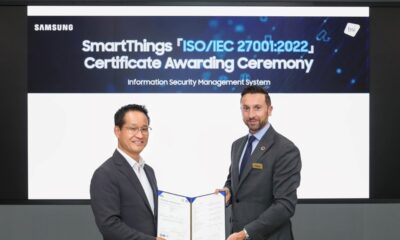One UI 3.0
Samsung One UI 3.0 Features: Latest, Changed, Improved, and Optimized

Samsung introduced One UI at SDC 2018, a new mobile software skin based on Android OS, designed for Samsung smartphone and works on the philosophy of “focus on what matters most”.
The South Korean tech giant made some big changes in the One UI user experience compared to the predecessor “Samsung Experience” and brought simplicity on performing tasks under reach your hand’s thumb.
Including its initial version, Samsung has released six One UI versions since its launch:
- One UI 1.0
- One UI 1.1
- One UI 1.5
- One UI 2.0
- One UI 2.1
- One UI 2.5
With these One UI versions, Samsung has improved the overall user experience, improved One UI’s system performance, and added new features.
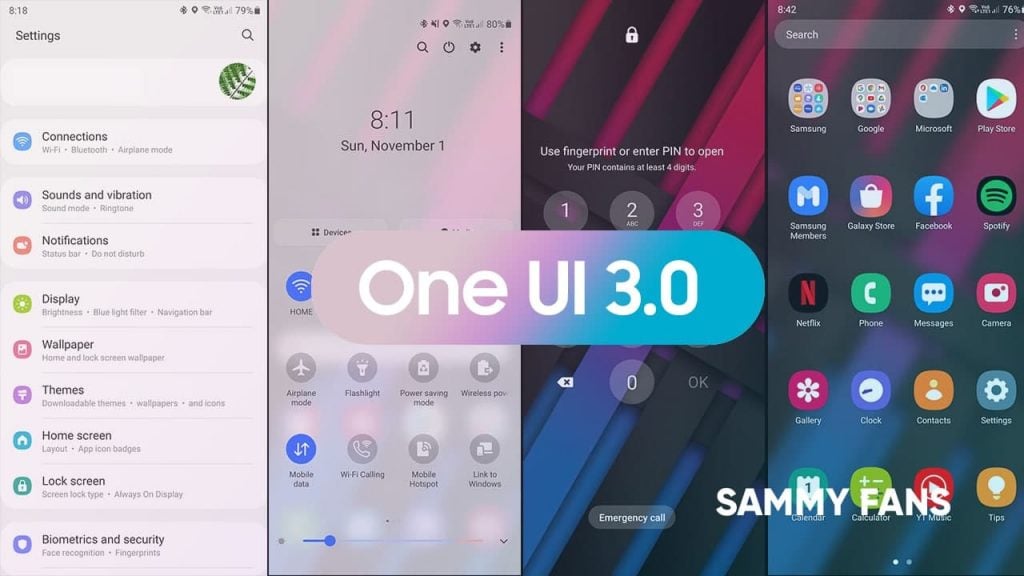
Aside from the history, the next version of Samsung’s mobile software, the One UI 3.0 is here. And the One UI 3.0 is out on the device with the Beta testing program.
With One UI 3.0, Samsung has made some remarkable changes in the user interface and accessibility that can easily reflects on the quick settings panel, settings menu, the app drawer, and other parts of the UI.
One UI 3.0 is based on Android 11 and brings you some of the features from the Android ecosystem.
One UI 3.0 beta is out and we’ve examined this new One UI version to extract every single new thing that Samsung included in this new One UI.
Want to download the Wallpaper used In this tutorial? download it from here.
One UI 3.0 Features and Changes that we’ve discussed in this article:
- Quick Settings/Notification Panel Redesign
- Volume Control
- Settings Menu
- Always on Display (AoD)
- FaceWidgets
- Double Tap To Sleep
- Notification Type and History
- Redesigned Long Press application menu
- Home screen, App Drawer, Folders, Finder and Recents
- Device Care
- Video enhancer
- Gallery App
- Caller screen layout
Lock screen:
Once you update your smartphone to One UI 3.0, the lock screen will be the first door that you need to unlock before moving to the world of new user interface changes.
But once you reach the lock screen, you’ll start noticing the changes in the user interface by yourself. The lock screen now has smoother fingerprint animation and a new lock icon hovers on the top center.
UI of the unlock method such as PIN UI is also changed compared to One UI 2.5 and comes with a dialer with round backgrounds that look very good.
Furthermore, the shortcut on the left and the right side has been grayed out and the respective apps open with a brand new animation from each side.

One UI 3.0: Lock Screen
Home Screen, App Drawer, Folders, Finder, and Recent Apps:
Talking of changes, how can we forget the important part of the user interface that you access most of the time in a single day.
The new effect in the user interface may seem little but it definitely improves the user experience.
Home Screen appears the same but when you open the App Drawer and Recent Apps, the new transparent background (Similar to the notification) will also be found here and more visible. Not only that, it helps you to view the apps and recent apps section better than before.
Moving on, Samsung has added some new functionality to the finder, which includes your recent apps, suggests, files in storage, and recent searches in different cards.

One UI 3.0: Home Screen

One UI 3.0: Home Screen
Quick Settings/Notifications Panel Redesign
One of the major changes in the One UI 3.0 includes the Notifications and Quick Settings panel overhaul.
The background of the Quick Settings panel has a semi-transparent blurred background, which increases the overall viewing experience and better highlights the quick setting buttons.
The Media and Devices options are now placed above the buttons. While, the search, power button, settings, and more menu icons are moved to the top right corner of the screen. Also, the date is moved to the center area. To mention, the edit button option has also received some changes.
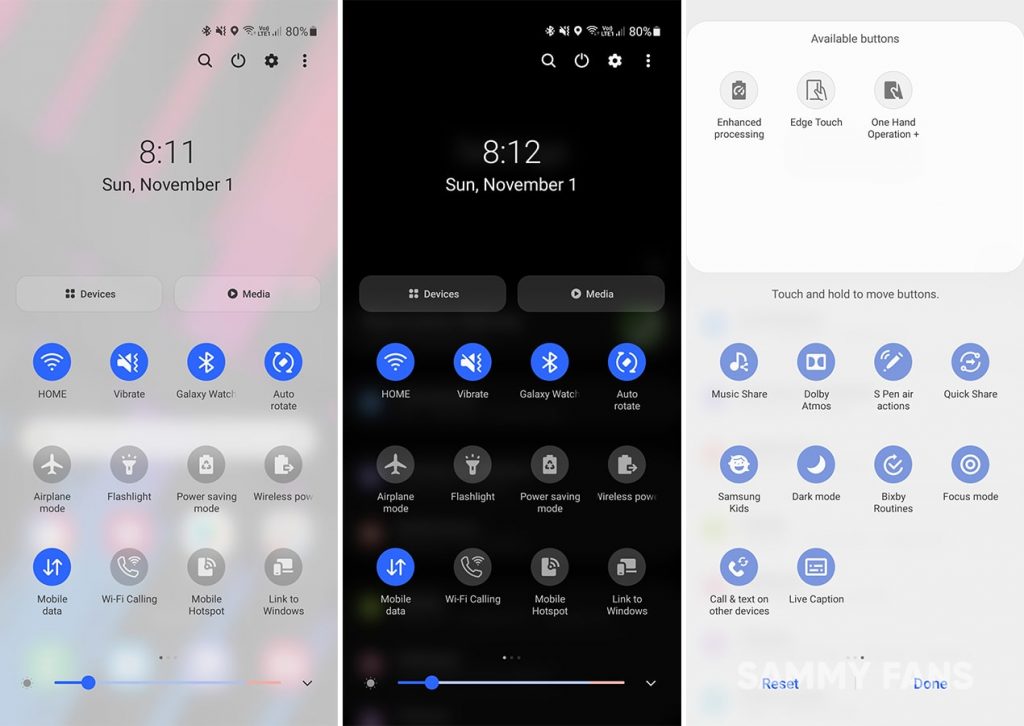
One UI 3.0: Notification Panel
Redesigned Volume Controls:
Samsung has completely redesigned the volume control panel and each control for Ring, Media, Notifications, and System and now appears “Vertically” instead of Horizontally in One UI 2.5.
The background of the volume controls has the same transparent and blurred finishing as the quick settings panel. It kinda looks cool.

One UI 3.0: Volume Controller
Settings Menu:
The Setting interface and its elements are one of the cleanest and nicely designed menu in any Android smartphones. The One UI 3.0 brings a redesigned and restructured settings app menu, which looks even better than before.
Talking first about the Samsung Account menu card, which has a bigger view of details such name, email, and profile avatar.
Coming to the menu items, the icons in the menu brings better and improved settings icons, and most importantly, a new color palette that looks way better than One UI 2.
Moreover, the subtle change in the spotlight feature is also noticeable and separated with dots instead of dashes (in One UI 2).

One UI 3.0: Settings Menu
Always on Display (AOD)
The Always-on Display is also improved with One UI 3.0 and now offers better AOD features.
The latest implementations in the AOD section bring new clock styles that now supports animated GIFs with some tiny customizations. Once you lock the phone, the GIF starts to play for a limited time.
You can also set an image from Gallery or download AOD themes from the themes store.
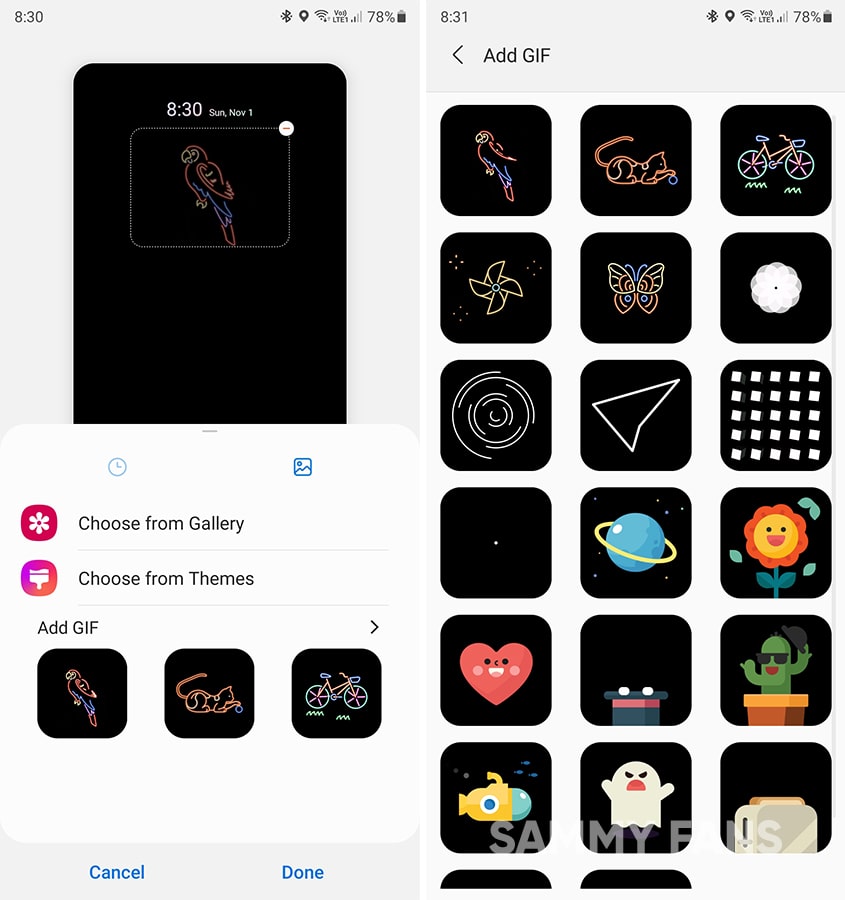
One UI 3.0: Always On Display GIFs
New FaceWidgets:
FaceWidgets are useful to get quick access to certain functionality including music playback, schedule, alarm, weather, Bixby routines.
With One UI 3.0, Samsung has given this lock screen feature a big overhaul and when you tap on the clock, you now have the option to swipe up or down. Once, you do this, there’s a whole screen with different cards will pop-up to provide a better view of the widget information than it was in the One UI 2.5.

One UI 3.0: New Face Widget
Double-tap to Sleep:
One UI system offers a feature to wake up the lock screen by double-tapping on the display and One UI 3.0 adds a new feature to sleeping the display by double-tapping to the screen, while the lock screen is on.

One UI 3.0: Tap To Sleep
New Notifications:
One UI 3.0 allows you to set how notifications will show as they arrive. In the notification panel, notifications are grouped to make them easier for you to read at glance.
Ongoing conversations in your chat and messaging apps are shown on top so you can get them quickly. Alert notifications will give you an indication when they arrive. Silent notifications provide useful information without interrupting you.
To make the notification viewing experience simpler, One UI 3.0 now allows you to select between Brief and Detailed notification styles:
Brief: It’ll allow you to see text-only pop-up notification details. You’ll have the option to select a specific app that will be shown as brief. Moreover, you select the color of the notification by a keyword and even show while the screen is off.
Detailed: The Detailed view will appear in the notification bar, which is seen as usual.

One UI 3.0: Notification Settings
Notification History: With Android 11, Google introduced the new Android notification history manager, which now keeps the history of your notification.
This feature is now implemented in the One UI 3.0 and allows users to keep the history of recent and snoozed notifications.

One UI 3.0: Notification History
Redesigned Long Press on an application menu
Long press on an application option is very useful to open a set of features to view a notification or select from a range of services related to the respective app. This feature has been revamped with One UI 3.0.

One UI 3.0: Long Press Button
Battery and Storage Management:
The Device Care feature is in the Settings is now renamed to “Battery and device care”. Both Battery and Storage screen also received some noticeable changes in their features respectively.

One UI 3.0: Battery and Storage (Device Care)
Video enhancer:
Video enhancer improves the image quality of your videos to enjoy brighter and more vivid colors. This feature supports Samsung’s native video player, YouTube, and Netflix and on One UI 3.0, it supports Google Play Movies & TV.
Also, users can turn on or off an individual app by using the Video Enhancer feature, using the switches.

One UI 3.0: Video Enhancer
New Gallery App UI:
Yes, we’ve to talk about the Samsung Gallery app, and One UI 3.0 has brought new changes in this photo or video viewing application.
The options from the Gallery app user interface is now restructured. Beginning from the top, the options previously had Videos, Favorites, Locations, and Suggested sections to sort out images and videos in respective categories.
In One UI 3.0, these options are gone but only from the top and moved to the bottom bar inside the new hamburger icon menu alongside Trash and Settings features. Also, the same restructuring has been made throughout the Gallery app.

One UI 3.0: Gallery User Interface
Caller screen layout and caller background:
One UI 3.0 makes your calling experience even better because you select a picture or video to show You can select a picture or video to show when you make or receive a call.
You can also choose a layout on how to show caller info when the person has a profile picture.

One UI 3.0: Call Screen
Recycle Bin for Phone and Messages:
One of the most important features, Trash is now added to the Phone and Messages app. Once you delete a message or a contact it’ll go to their Trash respectively and it’ll stay there for at least 30 days before it deletes permanently.
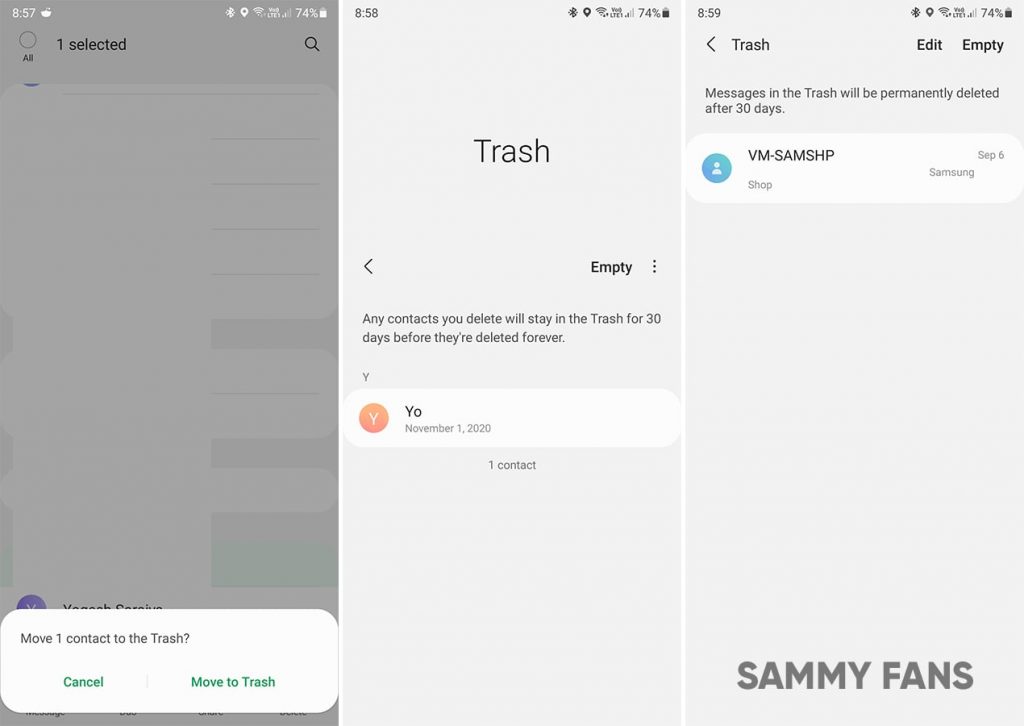
One UI 3.0: Contact and Messages Trash
One UI 3.0 Rollout:
Samsung is currently rolling out One UI 3.0 for Galaxy S20 and Galaxy Note 20 series devices in different markets and the company are also preparing to rollout this latest One UI version to more devices.
If you want to know the list of eligible devices and the latest news regarding the One UI 3.0, take a look at the articles linked below.
One UI 3.0
One UI 4.0 vs One UI 3.0: How Samsung enhanced its One UI between these two versions?
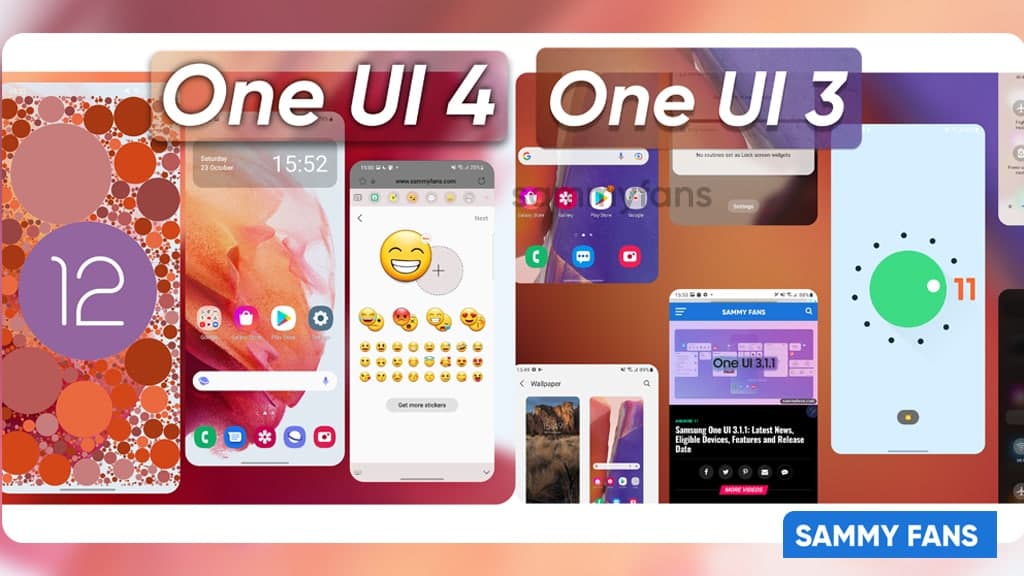
Back in December 2020, Samsung officially released the One UI 3 updated to its eligible Galaxy devices, bringing an exciting new design, enhanced everyday features and deep customization. With Android 11 OS, Samsung provided the latest in innovations to consumers, as part of a promise to support three generations of applications (OS) for the development of millions of devices.
As we know, Samsung has recently uncovered the stable One UI 4/Android 12 updates to Galaxy S21 series including Galaxy S21, Galaxy S21+ and Galaxy S21 Ultra. Samsung has done an excellent job of updating their devices to One UI 4.0 based on Android 12 a few weeks ago.
A software update has already been made on a few Galaxy devices, and we expect Samsung to keep up with its immediate release schedule for the next software release – the One UI 4.0. While you are waiting for the update to be released on your device, here’s a quick look at all the new software features and changes included in One UI 4.0.

One UI 4.0 vs One UI 3.0
One UI 4.0 vs One UI 3.0: A new, refreshed design for an enhanced aesthetic experience:
One UI 3.0/Android11
The One UI 3.0 brings simplicity and beauty to the One UI experience that Galaxy users have already enjoyed. Within the interface, the features that you use and visit most often – such as the home screen, lock screen, notifications and Instant Panel – are visually enhanced to highlight important information.
New viewing effects, like the Dim/Blur effect of notifications, help you quickly focus on what’s most important, and redesigned widgets keep your home screen looking neat, clean and stylish.
The One UI 3 does not just look different – it sounds different, too. Smooth movement and animation, combined with a natural haptic response, make roaming and using your phone a pleasure.

One UI 4.0/Android 12
With One UI 4, users get customization options all the time. A wealth of theme options allow users to customize the look and performance of their device, providing them with tools for customizing their home screens, icons, notifications, wallpapers and much more.
Samsung’s One UI 4 allows you to create a customized mobile experience to meet your unique needs and express your personality. With so many new Color Palettes to choose from, you can change the look and feel of everything from your home screen to the icons, menu, button and background.
And with redesigned widgets that offer even more in-depth customization, it has never been easier to put your own stamp on your smartphone information. You can even easily express yourself with various emoji features, GIFs and stickers available directly on your keyboard.
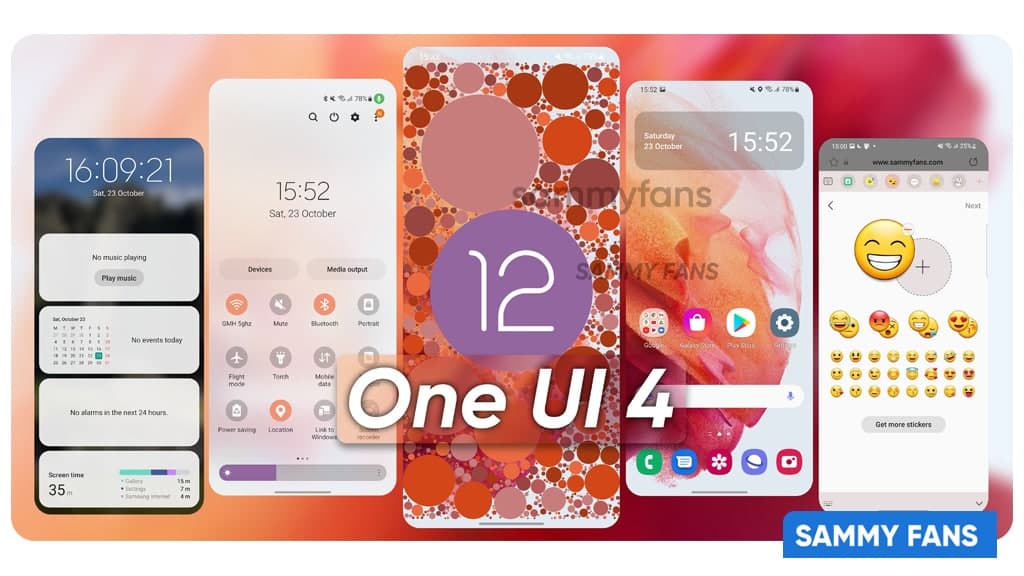
Don’t forget to visit: Everything about Samsung One UI 4.0 – Update, tips, features and more
Get notified –
Aside from SammyFans’ official Twitter and Facebook page, you can also join our Telegram channel and subscribe to our YouTube channel to get notified of every latest development in Samsung and One UI ecosystem. Also, you can follow us on Google News for regular updates.
Android 11
Samsung Android 11 One UI 3.1: Official Release Date and Eligible Devices [Roadmap]
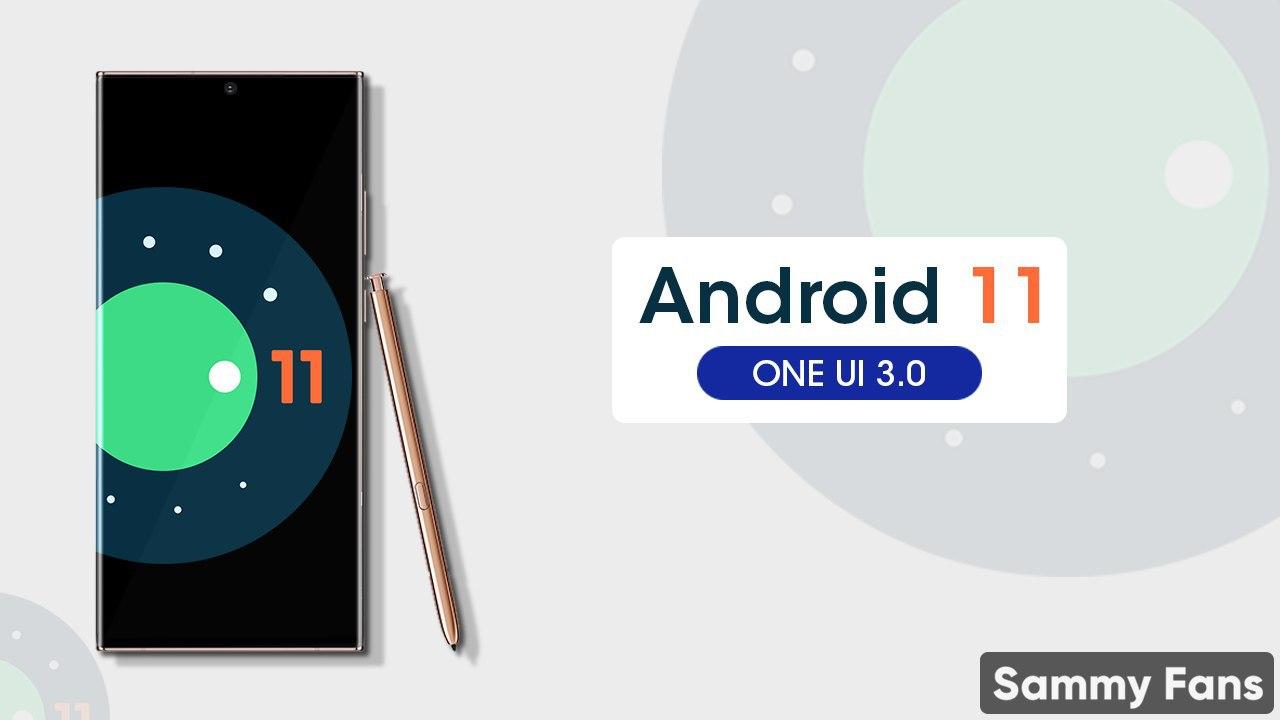
Back in December 2020, Samsung has officially launched the third generation of its custom skin – One UI 3.0, which is based on Google’s Android 11 operating system. Starting with the latest flagship smartphones, the company has impressively managed to send this major update to a number of Galaxy phones and tablets including mid-range and budgets.
Samsung One UI 3.0/Android 11 rollout roadmap:
| Device | Release Date |
|---|---|
| Galaxy S20 | December-2020 |
| Galaxy S20+ | December-2020 |
| Galaxy S20 Ultra | December-2020 |
| Galaxy S20 5G | December-2020 |
| Galaxy S20+ 5G | December-2020 |
| Galaxy S20 Ultra 5G | December-2020 |
| Galaxy Note 20 | January-2021 |
| Galaxy Note 20 Ultra | January-2021 |
| Galaxy Note 20 5G | January-2021 |
| Galaxy Note 20 Ultra 5G | January-2021 |
| Galaxy Z Fold 2 | January-2021 |
| Galaxy Z Fold 2 5G | January-2021 |
| Galaxy Z Flip | January-2021 |
| Galaxy Z Flip 5G | January-2021 |
| Galaxy Note 10 | January-2021 |
| Galaxy Note 10+ | January-2021 |
| Galaxy Note 10+ 5G | January-2021 |
| Galaxy S10e | January-2021 |
| Galaxy S10 | January-2021 |
| Galaxy S10+ | January-2021 |
| Galaxy S10 5G | January-2021 |
| Galaxy Note 10 Lite | March-2021 |
| Galaxy S10 Lite | January-2021 |
| Galaxy S20 FE | January-2021 |
| Galaxy S20 FE 5G | January-2021 |
| Galaxy Fold | January-2021 |
| Galaxy Fold 5G | February-2021 |
| Galaxy Tab S7 | April-2021 |
| Galaxy Tab S7 5G | April-2021 |
| Galaxy Tab S7+ | April-2021 |
| Galaxy Tab S7+ 5G | April-2021 |
| Samsung Galaxy A-series | |
| Galaxy A01/A01 Core | June-2021 |
| Galaxy A10 | August-2021 |
| Galaxy A10e | August-2021 (Expected) |
| Galaxy A10s | August-2021 |
| Galaxy A11 | June-2021 |
| Galaxy A20 | August-2021 |
| Galaxy A20e | August-2021 (Expected) |
| Galaxy A20s | August-2021 |
| Galaxy A21 | May-2021 (Expected) |
| Galaxy A21s | May-2021 |
| Galaxy A30 | July-2021 |
| Galaxy A30s | August-2021 |
| Galaxy A31 | May-2021 |
| Galaxy A40 | April-June 2021 (Expected) |
| Galaxy A41 | April-June 2021 (Expected) |
| Galaxy A42 5G | April-June 2021 (Expected) |
| Galaxy A50 | April-2021 |
| Galaxy A50s | April-2021 (Expected) |
| Galaxy A51 | March-2021 |
| Galaxy A51 5G | March-2021 |
| Galaxy A51 5G UW | March-2021 (Expected) |
| Galaxy A60 | April-June 2021 (Expected) |
| Galaxy A70 | May-2021 |
| Galaxy A70s | May-2021 |
| Galaxy A71 | May-2021 |
| Galaxy A71 5G | May-2021 |
| Galaxy A71 5G UW | May-2021 (Expected) |
| Galaxy A80 | May-2021 |
| Galaxy A8s | April-June 2021 (Expected) |
| Galaxy A90 5G | April-June 2021 (Expected) |
| Galaxy A Quantum | April-June 2021 (Expected) |
| Samsung Galaxy M-series | |
| Galaxy M01 | June-2021 |
| Galaxy M01s | June-2021 (Expected) |
| Galaxy M11 | June-2021 |
| Galaxy M21 | March-2021 |
| Galaxy M21s | Match-2021 (Expected) |
| Galaxy M30s | March-2021 |
| Galaxy M31 | March-2021 |
| Galaxy M31s | May-2021 |
| Galaxy M31 Prime | March-2021 (Expected) |
| Galaxy M40 | June-2021 |
| Galaxy M51 | April-2021 |
| Samsung Galaxy F-series | |
| Galaxy F41 | July-2021 (Expected) |
| Other eligible devices | |
| Galaxy Tab Active 3 | Later next year (Expected) |
| Galaxy Tab A7 10.4 2020 | Later next year (Expected) |
| Galaxy Tab S5e | July-2021 |
| Galaxy Tab S6 | May-2021 |
| Galaxy Tab S6 5G | May-2021 |
| Galaxy Tab S6 Lite | May-2021 |
| Galaxy Tab A 10.1 2019 | August-2021 |
| Galaxy Tab A 8.0 2019 | August-2021 |
| Galaxy Tab Active Pro | August-2021 |
| Galaxy Xcover 4s | Later next year (Unknown) |
| Galaxy Xcover Pro | Later next year (Expected) |
* Update schedule and eligible models could be changed if the company encounters any issues through ongoing review.
Note:
- Update schedule could be changed
- Eligible models could be changed
- The update may also be halted for a while
- The update may also be suspended after the official update
Eligible devices for One UI 3.0/Android 11:
- Samsung Galaxy S20
- Samsung Galaxy S20+
- Samsung Galaxy S20 Ultra
- Samsung Galaxy Note 20
- Samsung Galaxy Note 20 Ultra
- Samsung Galaxy Z Fold 2
- Samsung Galaxy Z Fold 2 5G
- Samsung Galaxy Z Flip
- Samsung Galaxy Z Flip 5G
- Samsung Galaxy Note 10
- Samsung Galaxy Note 10+
- Samsung Galaxy Note 10+ 5G
- Samsung Galaxy S10e
- Samsung Galaxy S10
- Samsung Galaxy S10+
- Samsung Galaxy S10 5G
- Samsung Galaxy Note 10 Lite
- Samsung Galaxy S10 Lite
- Samsung Galaxy S20 FE
- Samsung Galaxy S20 FE 5G
- Samsung Galaxy Fold
- Samsung Galaxy Fold 5G
- Samsung Galaxy Tab S7/ S7+
- Samsung Galaxy Tab S7 5G/S7+ 5G
- Samsung Galaxy A90 5G
- Samsung Galaxy A80
- Samsung Galaxy A71/A71 5G/A71 5G UW
- Samsung Galaxy A70s
- Samsung Galaxy A70
- Samsung Galaxy A60
- Samsung Galaxy A51/A51 5G/A51 UW
- Samsung Galaxy A50/A50s
- Samsung Galaxy A42 5G
- Samsung Galaxy A41
- Samsung Galaxy A40
- Samsung Galaxy A31
- Samsung Galaxy A30s
- Samsung Galaxy A30
- Samsung Galaxy A21s
- Samsung Galaxy A21
- Samsung Galaxy A20/A20s
- Samsung Galaxy A11
- Samsung Galaxy A10/A10s
- Samsung Galaxy A01/A01 Core
- Samsung Galaxy M51
- Samsung Galaxy M40
- Samsung Galaxy M31/M31s/M31 Prime
- Samsung Galaxy M21/M21s
- Samsung Galaxy M11
- Samsung Galaxy F41
- Samsung Galaxy Tab S6/S6 5G/S6 Lite
- Samsung Galaxy Tab S5e
- Samsung Galaxy Tab A 10.1 2019
- Samsung Galaxy Tab Active Pro
We will regularly update this article if there are any schedule or model list changes.
Features
QUICK PANEL
- Switch, back and forth between your music and videos.
- Enhanced notification panel, more information at a glance even when the phone is locked.
- Easily check messages from multiple apps in one place.
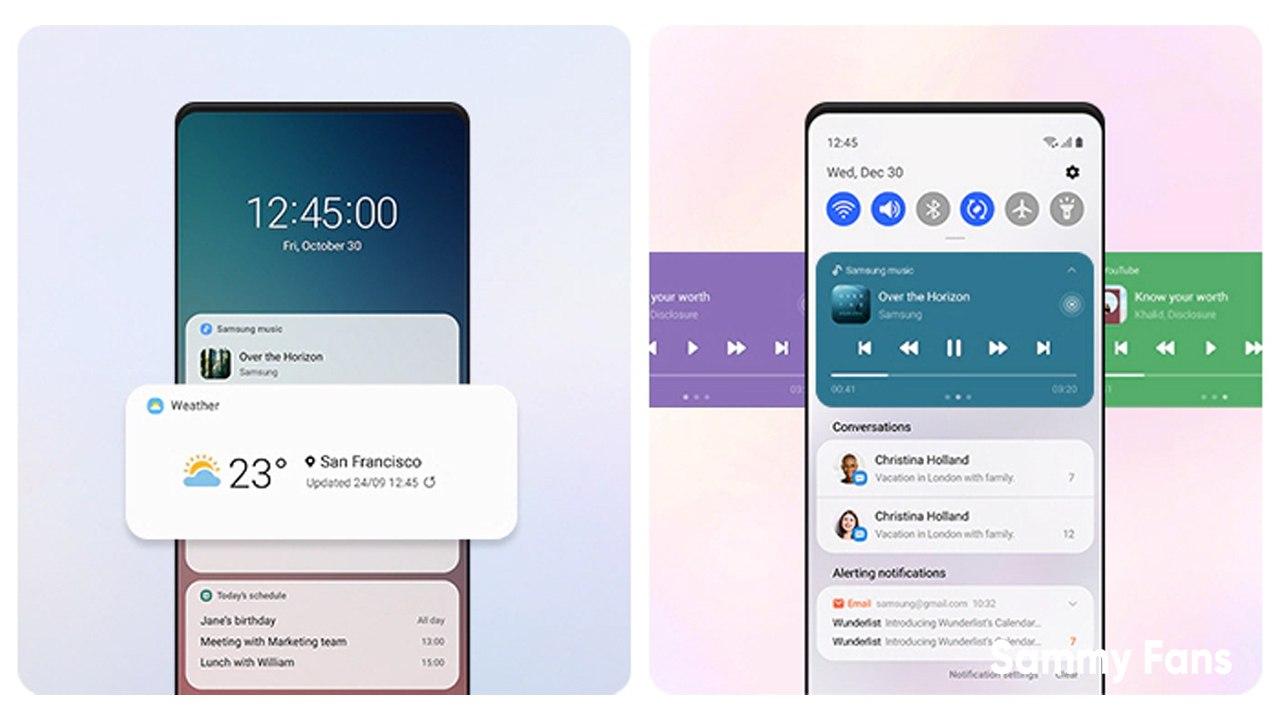
DYNAMIC LOCK SCREEN
- Plenty of high-quality images in 10 different categories
- Refresh your lock screen with another image each time your phone is unlocked
Now also available for Galaxy Tab devices.

GOOD LOCK
- Easily personalize your device in more than one way to suit your preference.
- With Wonderland, create your own moving wallpaper.
- With Pentastic, customize your S Pen Air commands, pointer, and sound settings.
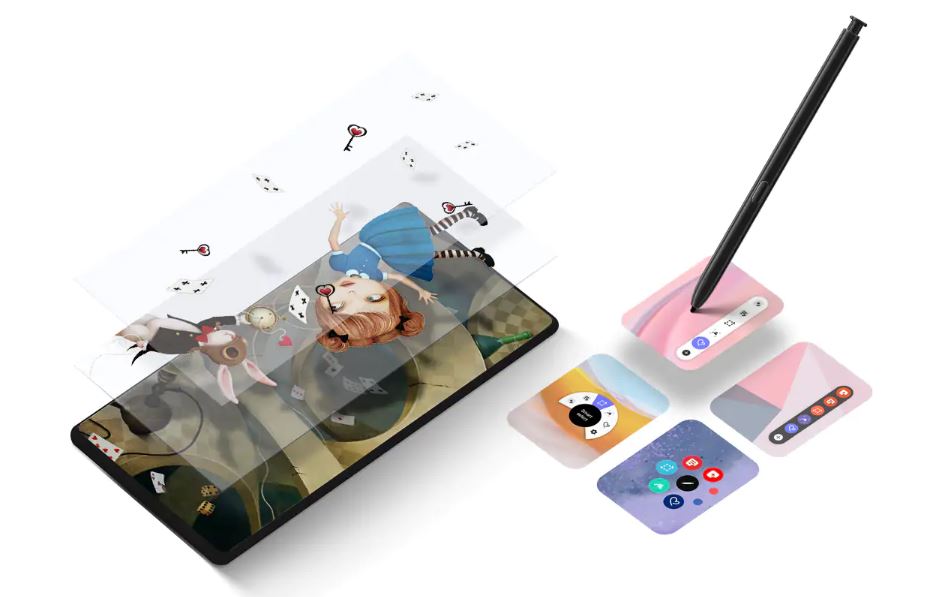
DO MULTIPLE TASKS ON THE SAME SCREEN
- Split your screen in half or three to make multitasking perfectly open.
- Open multiple apps and place them in a position and size that seems appropriate
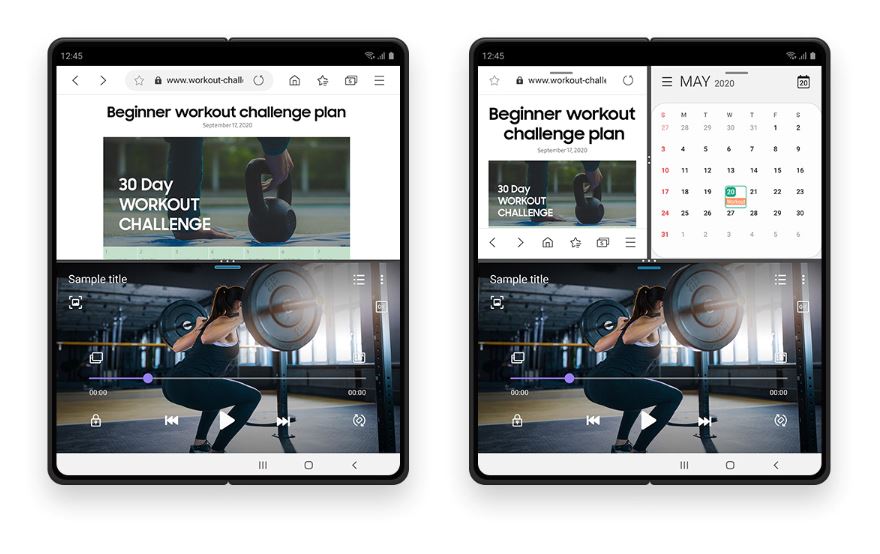
NEW WAYS TO TAKE YOUR BEST SHOT
DOUBLE PREVIEW
- Thanks to the foldable phone with two screens.
- Not only the photographer, but the object can also see the preview.
- Adjust your posture while checking out how to take photos.

A MORE ENJOYABLE WAY TO COMMUNICATE
- Enjoy communicating with your friends and colleagues.
- Supports fullscreen video calls with One UI 3.
- Make video calls more enjoyable with AR emoji masks.

ENJOY THE BEST ANDROID EXPERIENCE ON YOUR GALAXY
- An enjoyable experience secured by a multi-layered Knox security platform.
- Knox protects your personal data.
- With Smart Switch, transfer your data from your old device to your new Galaxy when you switch easily and securely.
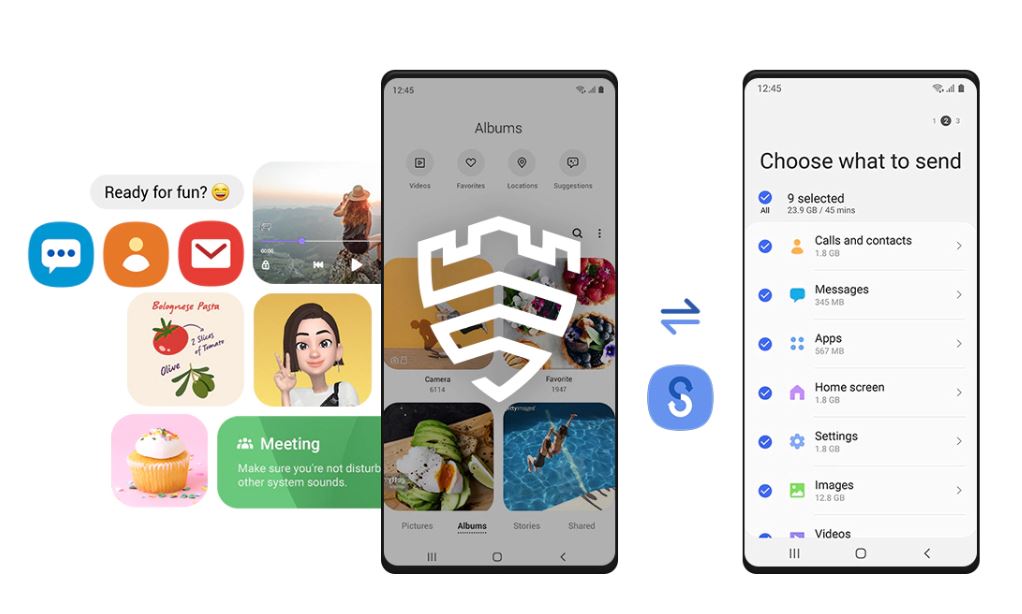
Android 11
Samsung Android 11 One UI 3.1 Update Tracker (October 17, 2021)
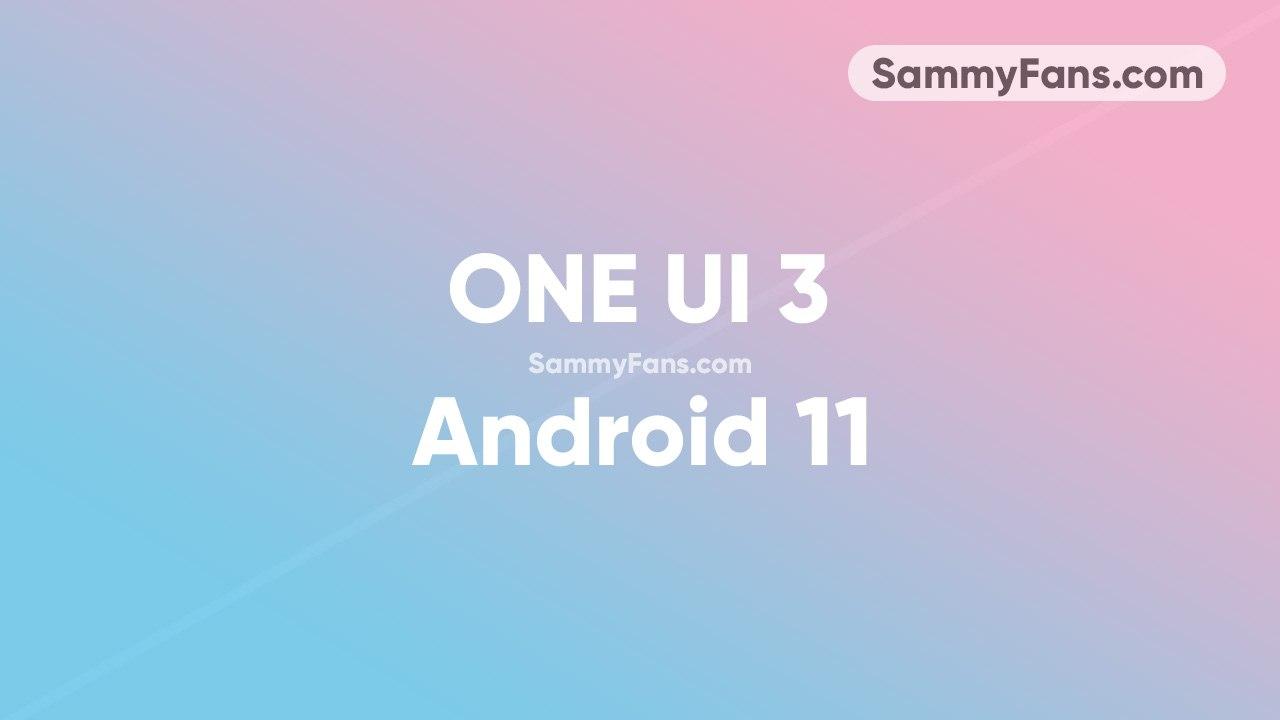
Samsung One UI 3.0 is based on Android 11 and comes with various new features as well as user interface improvements. These new changes also bring improved user experience with more simplicity.
Starting with the Galaxy S20 series, around three dozen of Galaxy models have received the Android 11-based One UI 3.0 firmware update. Moreover, the Korean tech giant is continuously working to send this update to the remaining devices.
Meanwhile, you may have been wondering what will happen to your Galaxy smartphone, whether it’ll receive One UI 3 (Android 11) or not? Well, for this you can check our complete device list of One UI 3.0 eligible devices here.
Also, if you’re wondering which devices receiving the One UI 3.0 (Android 11) and how it’s progressing around the world, we got you cover on this topic. And created this article to keep you updated with the Samsung One UI 3.0/Android 11.
Join us on Telegram
Below you can check the rollout countries, devices, and latest news regarding the One UI 3.0/Android 11:
Tip Corner (Have any suggestion? send us on contacts below)
- [email protected]
- Message us on Twitter
These Samsung Galaxy devices are currently getting Android 11: SammyFans
- Galaxy S21 5G – Pre-installed
- Galaxy S21+ 5G – Pre-installed
- Galaxy S21 Ultra 5G – Pre-installed
- Galaxy S20
- Galaxy S20 5G
- Galaxy S20 UW 5G
- Galaxy S20+
- Galaxy S20+ 5G
- Galaxy S20 Ultra
- Galaxy S20 Ultra 5G
- Galaxy Note 20
- Galaxy Note 20 5G
- Galaxy Note 20 Ultra
- Galaxy Note 20 Ultra 5G
- Galaxy S20 FE
- Galaxy Z Flip 5G
- Galaxy S10 Lite
- Galaxy Note 10
- Galaxy Note 10+
- Galaxy Note 10+ 5G
- Galaxy Z Flip
- Galaxy S10e
- Galaxy S10
- Galaxy S10+
- Galaxy S10 5G
- Galaxy Z Fold 2 5G
- Galaxy Fold
- Galaxy Tab S7
- Galaxy Tab S7+
- Galaxy Note 10 Lite
- Galaxy M21
- Galaxy F41
- Galaxy XCover Pro
- Galaxy A51
- Galaxy A71
- Galaxy M30s
- Galaxy M31s
- Galaxy M31
- Galaxy Note 10 Lite
- Galaxy Tab S6 LTE
- Galaxy Tab S6 Lite
- Galaxy M12 – Pre-installed
- Galaxy XCover 5 – Pre-installed
- Galaxy A32 5G – Pre-installed
- Galaxy A32 4G – Pre-installed
- Galaxy F62 – Pre-installed
- Galaxy M30s
- Galaxy M31s
- Galaxy A71
- Galaxy Tab S6 LTE
- Galaxy Tab S6 Lite
- Galaxy M51
- Galaxy A40
- GalaxyA70
- Galaxy A70s
- Galaxy A50
- Galaxy A80
- Galaxy A90
- Galaxy A31
- Galaxy A01
- Galaxy A41
- Galaxy M01
- Galaxy Tab A7
- Galaxy M11
- Galaxy M02s
- Galaxy F02s
- Galaxy A02s
- Galaxy A11
- Galaxy Tab S6 at Verizon
- Galaxy A12
- Galaxy A30
- Galaxy W20 5G (China)
- Galaxy A40s (China)
- Galaxy Tab A with S Pen
- Galaxy A20e
- Galaxy A30s
- Galaxy A20
- Galaxy Jean 2
- Galaxy M10s
- Galaxy Tab A 10.1
- Galaxy Tab A 8.0 (2019)
- Galaxy M10s
- Galaxy XCover 4s
- Galaxy A11
- Galaxy A01
- Galaxy Tab A 8.4 (2020)
- Galaxy Tab A 10.1 (2019)
- Galaxy A10s
- Galaxy A20s
- Galaxy M01s
- Galaxy A10e
- Galaxy A20 [USA]
- Galaxy A10
- Galaxy A02
“Join Sammy Fans on Telegram“
One UI 3.0/One UI 3.1 Latest News:
[October 17, 2021]
Samsung Galaxy A21 gets Android 11 One UI 3.1 update in the US
[October 01, 2021]
Samsung Galaxy A02 gets Android 11-based One UI 3.1 update, September 2021 patch
[August 14, 2021]
Galaxy A10 gets Android 11 One UI 3.1 update as Samsung prepares for Android 12
[July 20, 2021]
Samsung released Android 11 and One UI 3.1 update for Galaxy A10e
[July 19, 2021]
Samsung Galaxy M01s started getting Android 11 One UI 3.1 update in India
[July 09, 2021]
Samsung Galaxy A10s gets Android 11 (One UI 3.1) update, July 2021 security patch
[July 07, 2021]
Samsung Galaxy A20s gets Android 11 (One UI 3.1) update, June 2021 security patch
[July 05, 2021]
Samsung rolling out Android 11-based One UI 3.1 update for Galaxy Tab A 10.1 (2019)
[July 03, 2021]
Samsung Galaxy Tab A (8.4-inch) finally receives Android 11 One UI 3.1 update [Verizon/AT&T]
[June 30, 2021]
Samsung releases Android 11 One UI 3.1 update for Galaxy Tab A 8.0 (2019)
[June 29, 2021]
Samsung releases Android 11 One UI 3.1 update for Galaxy Tab A 8.0 (2019)
[June 28, 2021]
Samsung Galaxy M10s gets Android 11-based One UI 3.1 update in India
[May 30, 2021]
Samsung Galaxy A30 Android 11 One UI 3.1 update has arrived!
[May 14, 2021]
Samsung Galaxy A11 gets One UI 3.1 and Android 11 update with various new features
[April 24, 2021]
Breaking: Samsung’ entry-level Galaxy A01 gets Android 11-based One UI 3.1 update
[April 23, 2021]
Samsung Galaxy M40 now receiving Android 11-based One UI 3.1 update in India
[April 20, 2021]
[April 19, 2021]
Samsung Galaxy A31 getting Android 11-based One UI 3.1 update alongside April 2021 security patch
[April 16, 2021]
Android 11-based One UI 3.1 update now rolling out for Samsung Galaxy A60 smartphones
[April 09, 2021]
Verizon Samsung Galaxy A51 gets Android 11 One UI 3.0 update with various new features
[March 27, 2021]
Samsung Galaxy A7, A8, and A8+ 2018 users can get One UI 3.1 with Android 11 manually
[March 26, 2021]
Samsung releases One UI 3.1 update to the Galaxy Note 10 series in China with various new features
[March 26, 2021]
Verizon rolling out One UI 3.1 update for Samsung Galaxy S10 5G
[March 25, 2021]
- Samsung Galaxy A70s gets Android 11-based One UI 3.1 update in India
- It’s now Samsung Galaxy A90’s turn to get One UI 3.1/Android 11 update
[March 24, 2021]
Samsung Galaxy S20 FE gets One UI 3.1 update in Canada
[March 23, 2021]
- Samsung Galaxy Note 10 starts getting One UI 3.1 update in Canada
- Samsung Galaxy S10 lineup will start getting One UI 3.1 update in Canada next week
- Samsung rolling out Android 11-based One UI 3.1 update for Galaxy A40
[March 22, 2021]
- T-Mobile rolling out Samsung One UI 3.1 update for Galaxy S20 FE
- Samsung Galaxy A80 gets Android 11-based One UI 3.1 with March 2021 security update
[March 21, 2021]
T-Mobile Samsung Galaxy S20 One UI 3.1 update rollout begins!
[March 20, 2021]
Verizon releases Samsung One UI 3.1 update for the Galaxy A71 5G UW
[March 18, 2021]
AT&T rolling out One UI 3.1 update to Samsung Galaxy S10 and Note 10 series
[March 17, 2021]
- Android 11-based One UI 3.1 update rolling out for Samsung Galaxy A70
- Verizon Samsung Galaxy S10 One UI 3.1 update rollout begins!
- Verizon Samsung Galaxy Note 10 gets One UI 3.1 and March 2021 security update
[March 16, 2021]
Samsung One UI 3.1 Game Booster brings gaming experience to Galaxy users
[March 14, 2021]
- Samsung Galaxy A42 5G One UI 3.1 Android 11 update rollout begins [Changelog]
- Samsung Galaxy M31 gets One UI 3.1 along with March 2021 security update
[March 13, 2021]
Samsung Galaxy S20 FE getting One UI 3.1 update in the US
[March 12, 2021]
Samsung Galaxy Note 9 users can now get Android 11-based One UI 3.1 [Download Link]
[March 11, 2021]
Galaxy Tab S6 Lite gets Samsung DeX support with One UI 3.1
[March 10, 2021]
Samsung Galaxy M31s One UI 3.1 update rollout begins in India
[March 08, 2021]
Android 11-based One UI 3.1 update now rolling out for Samsung Galaxy A50
March 06, 2021
Samsung Galaxy M51 One UI 3.1 Android 11 firmware update rolling out now
March 05, 2021
- Samsung Galaxy S10 Lite One UI 3.1 update rollout begins
- Samsung Galaxy A71 gets One UI 3.1 update along with Android 11 via OTA
March 04, 2021
Samsung Galaxy Tab S6 Lite Android 11 firmware update just went public
March 03, 2021
Samsung Galaxy Tab S6 One UI 3.1 Android 11 update is rolling out now!
March 01, 2021
Samsung Galaxy Note 10 Lite gets One UI 3.1 update via OTA
FEBRUARY 24, 2021
Android 11-based One UI 3.0 update is now available widely for Samsung Galaxy M30s
FEBRUARY 07, 2021
Samsung Galaxy Note 10 and Note 10+ getting Android 11-based One UI 3.0 update [T-Mobile]
FEBRUARY 05, 2021
Samsung Galaxy XCover Pro Android 11 One UI 3.0 software rollout is now underway!
FEBRUARY 04, 2021
Samsung Galaxy A51 One UI 3.0 Android 11 firmware update just went public!
FEBRUARY 02, 2021
Samsung Galaxy S10 Android 11 One UI 3.0 update arrives in Canada
JANUARY 30, 2021
- Samsung Galaxy M21 gets One UI 3.0 Android 11 update
- Samsung Galaxy F41 silently gets One UI 3.0 Android 11 update
- Samsung Galaxy Note 10 Lite One UI 3.0 Android 11 firmware update rolling out now!
December 10, 2020
Samsung releases One UI 3.0 Beta 5 for Galaxy Note 20 series, stable update to come next
December 09, 2020
New touchscreen improvements rolling out with One UI 3.0 Beta 2 for Samsung Galaxy S20 FE
December 09, 2020
Samsung Galaxy S10 and Note 10 will receive One UI 3.0 beta update next week
December 09, 2020
Samsung One UI 3.0/Android 11: Eligible Devices and Release Date [Europe]
December 08, 2020
Following One UI 3.0, Samsung Gallery will no longer save copy of real image after editing
December 07, 2020
Android 11 based One UI 3.0 is now rolling out for Samsung Galaxy S20 series in India
December 07, 2020
Samsung Galaxy Z Fold 2 getting One UI 3.0 Beta 2 with several bug fixes
December 05, 2020
T-Mobile rolling out Android 11/One UI 3.0 update for Samsung Galaxy S20 series
December 04, 2020
PSA: Samsung Galaxy S9 and Note 9 are not listed in One UI 3.0/Android 11 roadmap
December 04, 2020
Samsung Good Lock for Android 11/One UI 3.0 will come in February 2021
December 04, 2020
December 03, 2020
Samsung One UI 3.0 officially launched with redesigned UI, new features and more
December 02, 2020
Breaking: Samsung starts One UI 3.0 beta program for Galaxy S20 FE in South Korea
December 02, 2020
Samsung Galaxy M-series Android 11/One UI 3.0/Android R rollout schedule
December 02, 2020
December 02, 2020
December 02, 2020
Samsung One UI 3.0/Android 11: Official Roadmap and Eligible Devices
December 02, 2020
Samsung Galaxy Note 10 series will receive One UI 3.0/Android 11 in January 2021
December 02, 2020
Samsung Galaxy S10 will receive One UI 3.0/Android 11 in January 2021
November 30, 2020
Samsung Galaxy Note 20 series starts receiving One UI 3.0 4th beta, stable update to come next
November 27, 2020
[Update: Rolling out] Samsung Galaxy Z Fold 2 starts getting One UI 3.0/Android 11 beta
November 27, 2020
No, Samsung Galaxy S8, S9, and Note 9 will not get Android 11 (One UI 3.0)
November 26, 2020
Samsung Galaxy S10 users facing camera issues after installing One UI 3.0 beta
November 26, 2020
[UPDATE: New build] Samsung Galaxy S20 series getting One UI 3.0 Beta 7 in South Korea
November 26, 2020
Samsung ends One UI 3.0 first round beta registration for Galaxy S10 devices
November 26, 2020
[Update: To resume from tomorrow] Samsung Galaxy Z Fold 2 starts getting One UI 3.0/Android 11 beta
November 25, 2020
Samsung Galaxy S10e, S10 and S10 Plus receiving One UI 3.0 beta in India
November 25, 2020
One UI 3.0 beta released for Samsung Galaxy S10 series in UK
November 25, 2020
Breaking: Galaxy S10 series starts receiving Samsung One UI 3.0 (Android 11) beta
November 25, 2020
[Update: Halted] Samsung Galaxy Z Fold 2 starts getting One UI 3.0/Android 11 beta
November 25, 2020
Samsung One UI 3.0 beta locking out Galaxy Z Fold 2 users the same as One UI 2.0 did with Galaxy S10
November 25, 2020
Stable One UI 3.0 rollout starting soon for Galaxy S20 and Note 20 series, beta recruitment closed
November 25, 2020
[Update: Started] Samsung Galaxy S10 One UI 3.0 beta rollout will start today
November 24, 2020
Samsung One UI 3.0 beta already rolling out for Galaxy Note 10 series in India
November 24, 2020
[UPDATED] Samsung Galaxy S20 series receiving latest One UI 3.0 Beta 5 in India
November 24, 2020
Breaking: Samsung Galaxy Note 10 series starts getting One UI 3.0 Beta 2 in South Korea
November 24, 2020
Samsung will resume One UI 3.0 beta rollout for Galaxy Note 10, S10, and Z Fold 2 within this week
November 23, 2020
Samsung starts rolling out One UI 3.0 beta update for Galaxy Z Flip LTE in Korea
November 21, 2020
Samsung Galaxy S20 series getting One UI 3.0 Beta 7 in South Korea
November 20, 2020
Samsung Galaxy S10 and Note 10 One UI 3.0 beta could resume next week
November 20, 2020
Samsung Internet 13.0 beta adds a new feature with One UI 3.0 Improvement
November 19, 2020
Latest One UI 3.0 beta prevents you from downgrading to Android 10
November 19, 2020
Samsung One UI 3.0 Beta 6 arrives at Galaxy S20 in the US, stable release may be near
November 18, 2020
Samsung Galaxy S20 series receiving latest One UI 3.0 Beta 5 in India
November 18, 2020
Samsung rolling out One UI 3.0 Beta 6 for Galaxy S20 series in South Korea
November 18, 2020
Samsung rolling out new One UI 3.0 beta update for Galaxy S20 series in UK and Germany
November 17, 2020
November 13, 2020
- Breaking: Latest One UI 3.0 beta for Samsung Galaxy S20 series arrived with December 2020 security patch in India and UK
- Samsung rolling out One UI 3.0 Beta 5 for Galaxy S20 series in South Korea
November 11, 2020
- Samsung One UI 3.0 beta is now rolling out in Korea for Galaxy Note 10 series
- Samsung Galaxy Z Flip 5G gets a chance to experience One UI 3.0 beta
- Breaking: One UI 3.0 beta program starts for Samsung Galaxy Z Fold 2
- Breaking: Samsung starts One UI 3.0 beta program for Galaxy Note 10 series
- Breaking: One UI 3.0 beta program starts for Samsung Galaxy S10 series
November 10, 2020
Samsung Galaxy S20 series grabbing fourth One UI 3.0 beta in Korea
November 10, 2020
Samsung is now rolling out fifth One UI 3.0 beta for the Galaxy S20 series in Germany
November 10, 2020
Samsung Galaxy S20 series getting third One UI 3.0 beta in Poland and U.K.
November 10, 2020
Samsung starts Android 11/One UI 3.0 development for the Galaxy Z Fold 2 and S20 FE
November 09, 2020
How to use new Always on Display (AOD) on Samsung One UI 3.0
November 05, 2020
Galaxy S20 gets Google Play protect certificate after latest One UI 3.0 beta, stable coming soon
November 05, 2020
One UI 3.0 support for Samsung Music app brings new features, changes and bug fixes
November 05, 2020
App icons disappearing after recent One UI 3.0 beta update for Galaxy S20 series
November 04, 2020
November 04, 2020
Samsung is now rolling out second One UI 3.0 beta update for Galaxy Note 20 series in South Korea
November 04, 2020
Galaxy S20 series One UI 3.0 Beta 4 has some serious bugs, build pulled by Samsung
November 04, 2020
Samsung Galaxy Note 20 series receiving second One UI 3.0 beta with November 2020 security patch
November 04, 2020
A new One UI 3.0 beta is now rolling out to the Galaxy S20 devices in the US
November 03, 2020
Samsung One UI 3.0 fourth beta rolling out for Galaxy S20 series
November 03, 2020
Stable One UI 3.0 could come this month
November 02, 2020
Stable One UI 3.0 coming to the Galaxy devices from November 2020 or later: Samsung
November 02, 2020
New Good Lock modules coming with One UI 3.0 for always on display, gestures and screen capture
October 30, 2020
Samsung Galaxy S20 series is getting 3rd One UI 3.0 Beta with November 2020 security patch
October 30, 2020
One UI 3.0 support now available for Good Lock’s Sound Assistant
October 28, 2020
Samsung Galaxy S10e with Android 11 spotted on Checkfirm
October 27, 2020
Android 11 based One UI 3.0 beta is now live in the U.S. for Galaxy Note 20 series [Download Link]
October 27, 2020
Samsung One UI 3.0 beta full Changelog
October 27, 2020
When will my Galaxy S20 FE receive One UI 3.0 update? Here’s some information
October 27, 2020
Some users facing no sound issue while using Bluetooth on One UI 3.0 beta
October 26, 2020
One UI 3.1 to come with Samsung Galaxy S21, claims tipster
October 26, 2020
Samsung One UI 3.0/Android 11 is under testing for Galaxy S10 Lite, reveals CheckFirm
October 26, 2020
Breaking: Samsung starts Android 11 based One UI 3.0 beta program for Galaxy S20 series in China
October 23, 2020
Samsung Galaxy S20 series preparing for stable One UI 3.0 rollout
October 23, 2020
Samsung One UI 3.0 beta start rolling out in Poland for Galaxy S20 series
October 23, 2020
Samsung One UI 3.0 beta now rolling out in the U.S. for Galaxy Note 20 series
October 22, 2020
One UI 3.0 Beta 2 is now rolling out with several bug fixes for the Galaxy S20 series
October 22, 2020
Galaxy S20 series starts receiving Samsung One UI 3.0 (Android 11) beta in India
October 22, 2020
Breaking: One UI 3.0 beta is now live in India for Galaxy Note 20 and Note 20 Ultra
October 22, 2020
One UI 3.0 beta update for Galaxy S20 series brings new features and system improvements
October 21, 2020
Breaking: Samsung starts One UI 3.0 beta program for Galaxy Note 20 series in the U.S.
October 21, 2020
New One UI 3.0 beta for Galaxy S20 Ultra brings camera performance improvements
October 21, 2020
Samsung One UI 3 beta begins to rollout for Galaxy S20 series in the UK
October 20, 2020
Samsung One UI 3.0 beta program in the U.K. starts for Galaxy S20 series
October 19, 2020
One UI 3.0 beta brings Image stabilization for Zoom Viewfinder, improves digital zooming photography
October 17, 2020
[Update: Poland] Samsung start One UI 3.0 beta program for the Galaxy S20 series in Germany
October 16, 2020
Samsung One UI 3.0 beta registration starts for Galaxy Note 20 and Note 20 Ultra in India
October 16, 2020
Samsung One UI 3.0 beta registration starts for Galaxy Note 20 and Note 20 Ultra in Korea
October 16, 2020
Samsung starts One UI 3.0 beta program in India
October 15, 2020
One UI 3.0 beta testers do not update your Samsung Member app, otherwise, this will happen
October 15, 2020
Galaxy S20 series: Samsung may start rolling out Android 11, One UI 3.0 beta in late October
October 15, 2020
These T-Mobile Galaxy devices will get One UI 3.0/Android 11 in the U.S. [List]
October 14, 2020
Download One UI 3.0 Beta 1 based on Android 11 for Galaxy S20, S20+, and S20 Ultra
October 14, 2020
October 14, 2020
Samsung start One UI 3.0 beta program for the Galaxy S20 series in Germany
October 14, 2020
New One UI 3.0 beta brings bunch of bug fixes for camera zoom, physical keys, edge panel, and more
October 13, 2020
October 13, 2020
One UI 3.0 support now available for Good Lock’s Sound Assistant
October 13, 2020
Stable Android 11-based One UI 3.0 will come after November: Report
October 13, 2020
Samsung has no plan to release One UI 3.0 beta for the Galaxy S20 FE, no development yet
October 13, 2020
Do not install latest One UI 3.0 beta hotfix update, it has several serious issue
October 12, 2020
Samsung One UI 3.0 beta 1 hotfix update rolling out to the Galaxy S20 series
October 12, 2020
Camera filters may no longer available after One UI 3.0 (Android 11) upgrade
October 8, 2020
Android 11 (One UI 3.0) development started for the Galaxy S10e, S10, and S10+
October 7, 2020
After Korea, the first One UI 3.0 beta for the Galaxy S20 series is now rolling out in the US
October 6, 2020
[UPDATED] First One UI 3.0 beta is ready with software version ZTJ3, here’s the official notice
October 6, 2020
Breaking: Samsung starts Android 11-based One UI 3.0 public beta program
October 6, 2020
October 3, 2020
September 29, 2020
September 28, 2020
Galaxy S20 series: Samsung may start rolling out Android 11, One UI 3.0 beta in late October
September 26, 2020
One UI 3.0 support now available for Good Lock’s One Hand Operation+
September 22, 2020
September 9, 2020
Samsung One UI 3.0 Beta Program: Now Live in Korea
September 7, 2020
Samsung Wearable gets Android 11 support, One UI 3.0 release soon
September 7, 2020
Android 11 (One UI 3.0) is being tested on the Galaxy S20, M40, and A70s
September 7, 2020
Samsung pushed Internet 13.0 beta with ‘One UI 3.0 enhancements’ and much more
August 6, 2020
Samsung starts the One UI 3 (Android 11) Beta program for Developers











